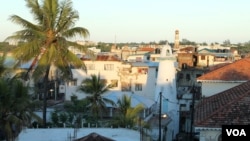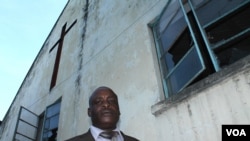MOMBASA, KENYA —
A wave of violent protest movements has been sweeping East Africa's "Swahili Coast" in Kenya and Tanzania. Areas on the coast have seen grenade attacks, church burnings and calls for secession. These movements are rooted in a sense of injustice and neglect.
Mombasa Republican Council
In a crowded back alley in Mombasa, where old men drink tea and women wash clothes, James Mwatsahu talks of revolution. He is a member of the Mombasa Republican Council (MRC), a movement channeling the frustrations of Kenya’s coastal people into calls for secession.
For years, the MRC was illegal, and its members are still regularly detained by police. Recently, the MRC has been accused of attacking election officials. Disillusionment with the government runs so deep in these parts, says Mwatsahu, that national elections would be pointless.
“We are saying, if they do not want to listen to us, then why do we go for voting? And who are we voting for? Are we voting for the same people who do not want to listen to us? So we are saying we don’t need any voting here in the Coast Province, because the people who we can vote for don’t want to listen to us,” he said.
The MRC claims that the coast is not part of Kenya at all. Some say this is just a way to call attention to the province, but Mwatsahu really does think his province should go its own way.
“Really, what we need is to secede," added Mwatsahu. "We can’t agree about this. We don’t have faith in the Kenyan government.”
Secessionist movement
The MRC is just one ripple in the wave of discontent sweeping East Africa’s Swahili coast. Sporadic violence and calls for secession reach down as far as Dar es Salaam. In coastal Kenya, it has given rise to riots, grenade attacks and church burnings.
Goodluck Washe, a community volunteer who works with local farmers and fishermen, says that in this area, such violence is unusual.
“The coastal people are very happy-go-lucky," said Washe. "They are calm people, and they are mild in their nature. It’s very interesting now when you see them, they are starting to arm themselves. It’s because they have been pushed to the wall.”
The most pressing grievance here is landlessness. Title deeds are increasingly in the hands of the rich, making hundreds of thousands of locals into squatters subject to eviction.
Unemployment
This, along with high unemployment, is having some dangerous side effects, according to prominent Muslim cleric Sheikh Ngao Juma. The lack of opportunities for young coastal men has made al-Shabab, a Somali terrorist group, seem like an attractive option, he says.
“Many youth are jobless," said Washe. "It’s not easy to get land in this region, you can get a piece of land in Somalia. So they are brainwashed and they go there - if I go to Somalia, I am employed as a military, I am armed, I shall get my salary, I get a parcel of land, I get a Somali beautiful lady there, and if I die I go to paradise with the 70 ladies untouched! So they cross over.”
With al-Shabab activity on the rise, Kenya’s anti-terror police have been cracking down, mounting raids in Mombasa and arresting dozens of suspects.
But Francis Auma, of the Mombasa-based non-governmental agency "Muslims for Human Rights," says such heavy-handed tactics have only widened the rift between the community and the state.
“The community attitude towards the policemen has been one of mistrust," said Auma. "There are many cases of people disappearing, there are many cases of people being mistreated by police, physically injured, [or] they die on the way. Hardly a month can go off without killings, and people believe strongly these are the police who are doing this.”
Police crackdown
One example is Badru Mramba, a samosa salesman who was taken away in handcuffs two weeks ago, and, according to his wife Rehema, simply disappeared. She says she has been looking for him, but fears the worst.
“Since Wednesday I’ve been to police stations, I’ve been to court, morning and afternoon sessions," she said. "I’m not seeing him till today, Monday. Many cases you hear, people have disappeared, you see them on bushes, dead. So you don’t know who these people are. I’ve heard nothing.”
But not everyone disapproves of the recent police operations.
Miltone Mudegu, a pastor at a Pentacostal church that was attacked and burned by Muslim youth during two days of rioting last August, says the police crackdown - both on extreme Islamists and on the MRC - is making Mombasa safer.
“We are thanking the government for what it’s doing, especially by confronting those who are instigating that mentality that the coast is not Kenya," said Mudegu. "You know, they are fanning the anger of these people. The government has taken the right procedures.”
Even if the government succeeds in suppressing the violence, says Auma, the coastal people are still angry and frustrated, and it could be dangerous to allow such tensions to simmer.
“People are still watching, but there’s anger," said Auma. "So it will just build up, build up, and trust me, this is not good, because one day one time, it can bring a lot of trouble. Once we suppress a lot of stuff, it can come out negatively.”
Kenyans will be electing a new president in March. But in the meantime, with the country’s history of electoral violence, the government is keeping a close watch on its restive and unhappy coast.
Mombasa Republican Council
In a crowded back alley in Mombasa, where old men drink tea and women wash clothes, James Mwatsahu talks of revolution. He is a member of the Mombasa Republican Council (MRC), a movement channeling the frustrations of Kenya’s coastal people into calls for secession.
For years, the MRC was illegal, and its members are still regularly detained by police. Recently, the MRC has been accused of attacking election officials. Disillusionment with the government runs so deep in these parts, says Mwatsahu, that national elections would be pointless.
“We are saying, if they do not want to listen to us, then why do we go for voting? And who are we voting for? Are we voting for the same people who do not want to listen to us? So we are saying we don’t need any voting here in the Coast Province, because the people who we can vote for don’t want to listen to us,” he said.
The MRC claims that the coast is not part of Kenya at all. Some say this is just a way to call attention to the province, but Mwatsahu really does think his province should go its own way.
“Really, what we need is to secede," added Mwatsahu. "We can’t agree about this. We don’t have faith in the Kenyan government.”
Secessionist movement
The MRC is just one ripple in the wave of discontent sweeping East Africa’s Swahili coast. Sporadic violence and calls for secession reach down as far as Dar es Salaam. In coastal Kenya, it has given rise to riots, grenade attacks and church burnings.
Goodluck Washe, a community volunteer who works with local farmers and fishermen, says that in this area, such violence is unusual.
“The coastal people are very happy-go-lucky," said Washe. "They are calm people, and they are mild in their nature. It’s very interesting now when you see them, they are starting to arm themselves. It’s because they have been pushed to the wall.”
The most pressing grievance here is landlessness. Title deeds are increasingly in the hands of the rich, making hundreds of thousands of locals into squatters subject to eviction.
Unemployment
This, along with high unemployment, is having some dangerous side effects, according to prominent Muslim cleric Sheikh Ngao Juma. The lack of opportunities for young coastal men has made al-Shabab, a Somali terrorist group, seem like an attractive option, he says.
“Many youth are jobless," said Washe. "It’s not easy to get land in this region, you can get a piece of land in Somalia. So they are brainwashed and they go there - if I go to Somalia, I am employed as a military, I am armed, I shall get my salary, I get a parcel of land, I get a Somali beautiful lady there, and if I die I go to paradise with the 70 ladies untouched! So they cross over.”
With al-Shabab activity on the rise, Kenya’s anti-terror police have been cracking down, mounting raids in Mombasa and arresting dozens of suspects.
But Francis Auma, of the Mombasa-based non-governmental agency "Muslims for Human Rights," says such heavy-handed tactics have only widened the rift between the community and the state.
“The community attitude towards the policemen has been one of mistrust," said Auma. "There are many cases of people disappearing, there are many cases of people being mistreated by police, physically injured, [or] they die on the way. Hardly a month can go off without killings, and people believe strongly these are the police who are doing this.”
Police crackdown
One example is Badru Mramba, a samosa salesman who was taken away in handcuffs two weeks ago, and, according to his wife Rehema, simply disappeared. She says she has been looking for him, but fears the worst.
“Since Wednesday I’ve been to police stations, I’ve been to court, morning and afternoon sessions," she said. "I’m not seeing him till today, Monday. Many cases you hear, people have disappeared, you see them on bushes, dead. So you don’t know who these people are. I’ve heard nothing.”
But not everyone disapproves of the recent police operations.
Miltone Mudegu, a pastor at a Pentacostal church that was attacked and burned by Muslim youth during two days of rioting last August, says the police crackdown - both on extreme Islamists and on the MRC - is making Mombasa safer.
“We are thanking the government for what it’s doing, especially by confronting those who are instigating that mentality that the coast is not Kenya," said Mudegu. "You know, they are fanning the anger of these people. The government has taken the right procedures.”
Even if the government succeeds in suppressing the violence, says Auma, the coastal people are still angry and frustrated, and it could be dangerous to allow such tensions to simmer.
“People are still watching, but there’s anger," said Auma. "So it will just build up, build up, and trust me, this is not good, because one day one time, it can bring a lot of trouble. Once we suppress a lot of stuff, it can come out negatively.”
Kenyans will be electing a new president in March. But in the meantime, with the country’s history of electoral violence, the government is keeping a close watch on its restive and unhappy coast.





